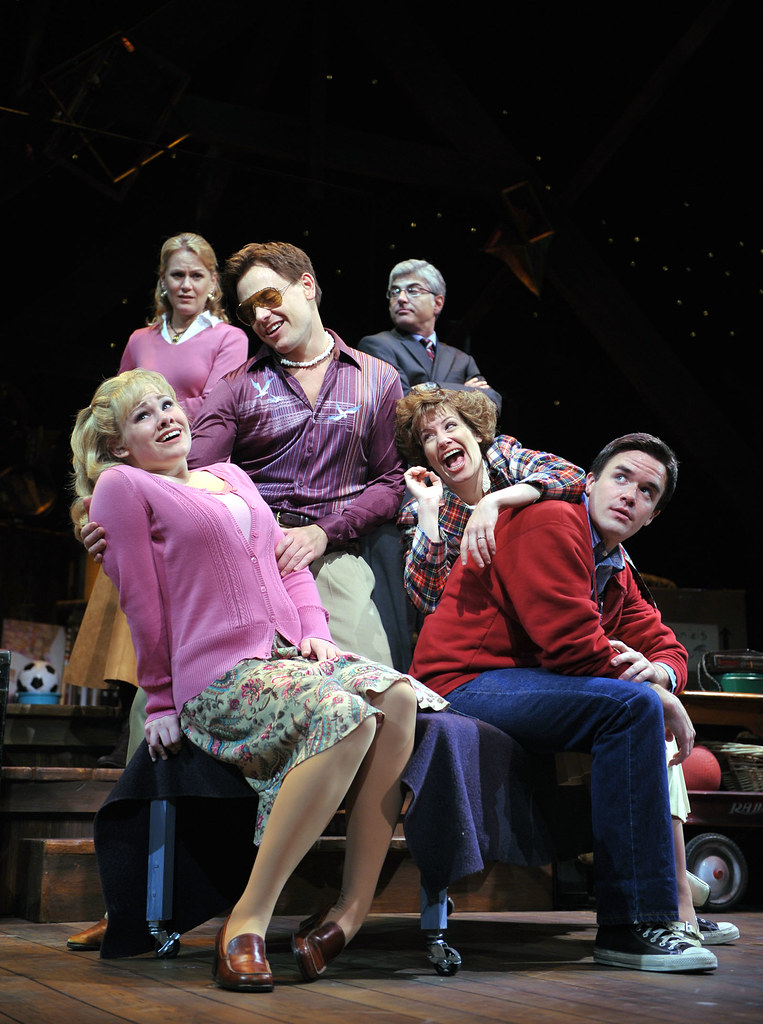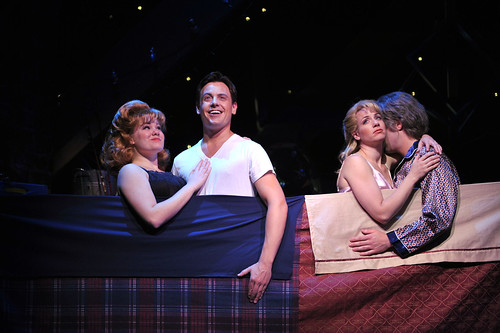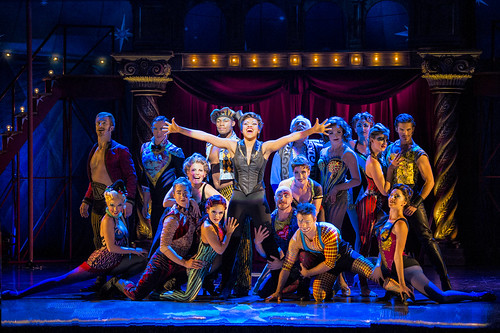
Sasha Allen (center) is the Player, in the touring production of Diane Paulus’ revival of Pippin, the 1972 musical by Stephen Schwartz and Roger O. Hirson. The exuberant new production is set in a circus. Below: John Rubinstein, who originated the role of Pippin in 1972, now plays Pippin’s father, King Charlemagne. Pippin is played by Matthew James Thomas. Photos by Terry Shapiro
Now this is how you revive a musical.Sure, you could set Les Misérables or Sunday in the Park with George in a circus with results that would likely be as baffling as they are entertaining. But when Diane Paulus was inspired to set her revival of Pippin under the big top, she was going for something more than a bright and shiny gimmick. Working with “circus creator” Gypsy Snier of the acclaimed Montréal-based theatrical circus company 7 doigts de la main, Paulus crafted a physical production that mirrored the emotional journey of the show’s central character.
It’s a brilliant concept and one that reenergizes the 1972 show and features its score by Stephen Schwartz and book by Roger O. Hirson off to their greatest advantage. Pippin still feels a little like a hippy ’70s musical (a good thing in my book), but this production finds something even more universal in it and makes it feel surprisingly of the moment.
The touring production of Paulus’ Tony Award-winning revival pulled in to the Golden Gate Theatre as part of the SHN season, and it’s a walloping good time. Everything from the cast (singers, dancers and acrobats), to the sets (by Scott Pask) to the lights (by Kenneth Posner to the music (band under the direction of Ryan Cantwell) is first rate and throbbing with life. That’s what you want from this show: color and fun and good old-fashioned razzle-dazzle – until you don’t.
And that’s the trick of Pippin. Originally directed and choreographed by Bob Fosse the show was sly and sexy and funny, doing for war and raping and pillaging and greed what Chicago (also a Fosse production) did for fame whoring. Fosse’s troupe of players, led by The Player, lent a cynical tone to Pippin’s quest for fulfillment. He thinks he’s extraordinary and destined for great things like fame, wealth and cosmic importance, but the players around him know better and continually pull him back into reality.
In Paulus’ production, that world of carnal lust, power lust, filthy lucre lust is embodied by Sasha Allen as The Player and by the extraordinary ensemble creating the acrobatic circus world around her. Everything is thrilling and gasp-inducing and marvelous and colorful – all the things you want a seductive world to be. And as Pippin, played here as on Broadway by Matthew James Thomas, moves through his journey toward fulfillment (“gotta find my corner of the sky”), the spinning circus of war and politics and sex and revolution is pretty seductive (and incredibly fun to watch).
Act 1 ends in a blaze of glory, but Act 2 presents a big challenge as Pippin actually evolves and begins to embrace a simpler life where fulfillment can be found in work, in nature, in relationships with other people. That writhing, bounding, thrusting mass of players and stunt people becomes a whole lot less important, which means the tone of Act 2 is quite different from Act 1. It’s slower, quieter and boasts a lot less dazzle. Some would say Act 2 is inferior to Act 1 for that reason, but to remain true to Pippin’s story, that’s how it has to be, and this another reason Paulus’ choice of the circus world is so astute. When the circus begins to abate, you really feel its absence. The problem isn’t the lack of spectacle but rather the blandness that begins to infuse Schwartz’s score here. Songs like “Kind of Woman” and “Love Song” are nice, but not nearly as satisfying as earlier tunes like “Magic to Do” or “Morning Glow.”
But the overall concept is a huge win, and it helps make sense of the book, allowing the audience to have a whole lot of fun along the way. Among the many highlights are “War Is a Science” as Pippin’s papa, King Charlemagne, teaches him how to head into battle. Charlemagne, or Charles as he’s called here, is played with gusto by John Rubinstein, who originated the role of Pippin in the original production. Rubinstein seems to relish every minute on stage, and he shows off some fancy knife work in the circus arena.
The show is all but stolen by Lucie Arnaz as Berthe, Pippin’s grandmother. Paulus and Snider have devised a routine for her that is at once astonishing and beautiful. The song, “No Time at All,” becomes the true showstopper of the evening – it’s a sing-along, a wonderful circus act and a surprisingly heartfelt communication between grandmother and grandson. (Side note: Andrea Martin, who won a Tony as Berthe on Broadway, reprises the role the last two weeks of the run in San Francisco.)
Another highlight is Sabrina Harper as Fastrada, wife of the king who would like their son Louis (not Pippin) to ascend the throne. Her number, “Spread a Little Sunshine,” shows off choreographer Chet Walker’s Fosse-inspired moves and gives us three lightning-fast costume changes (costume designs are by Dominiue Lemieux).
The show is chock full of wonderful little moments, from the conversation with the beheaded man to the disembodied legs pushing the cart to the hilarious chickens in the barnyard. It’s musical theater pageantry at its best (though the sound in the Golden Gate leaves something to be desired), and it’s a joy to run away with this unique, ultimately quite moving, circus.
[bonus interview]
I had the pleasure of interviewing Pippin circus creator Gypsy Snider, a San Francisco native and member of local circus royalty, for the San Francisco Chronicle. Read the story here.
FOR MORE INFORMATION
Pippin continues through Oct. 19 at the Golden Gate Theatre, 1 Taylor St., San Francisco. Tickets are $40 to $210. Call 888-746-1799 or visit www.shnsf.com.

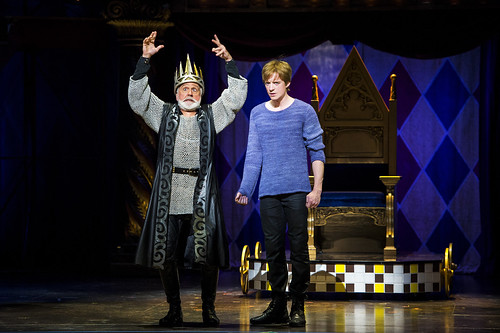
 Friday night at the San Mateo Performing Arts Center, Broadway composer Stephen Schwartz diverged from his set list after opening his show, Stephen Schwartz and Friends, with the sweet “Chanson” from his 1976 show The Baker’s Wife.
Friday night at the San Mateo Performing Arts Center, Broadway composer Stephen Schwartz diverged from his set list after opening his show, Stephen Schwartz and Friends, with the sweet “Chanson” from his 1976 show The Baker’s Wife.
 The expertly chosen, inspirational song, which echoes Obama’s rally cry of “Yes we can!” was slightly out of Schwartz’s range, but when the spirit moves you, notes hardly matter.
The expertly chosen, inspirational song, which echoes Obama’s rally cry of “Yes we can!” was slightly out of Schwartz’s range, but when the spirit moves you, notes hardly matter.
 For Callaway, there were two great moments: in the sadly sweet “Lion Tamer” (from 1974’s The Magic Show) and her bravura version of “Meadowlark” from The Baker’s Wife, which is a song she has been singing for years and sings just about better than anybody else. She also joined forces with Coulter on the “love medley” with Callaway taking the lead on “As Long As You’re Mine” from Wicked and Coulter on “In Whatever Time We Have” from Children of Eden.
For Callaway, there were two great moments: in the sadly sweet “Lion Tamer” (from 1974’s The Magic Show) and her bravura version of “Meadowlark” from The Baker’s Wife, which is a song she has been singing for years and sings just about better than anybody else. She also joined forces with Coulter on the “love medley” with Callaway taking the lead on “As Long As You’re Mine” from Wicked and Coulter on “In Whatever Time We Have” from Children of Eden.
 In addition to singing some heartfelt solos – “Forgiveness’ Embrace” from his 2002 album Uncharted Territories and “For Good,” the emotional finale of Wicked – Schwartz offered a master class in songwriting for musicals by taking us through the evolution of “The Wizard and I,” the young witch’s cris de coeur from Wicked.
In addition to singing some heartfelt solos – “Forgiveness’ Embrace” from his 2002 album Uncharted Territories and “For Good,” the emotional finale of Wicked – Schwartz offered a master class in songwriting for musicals by taking us through the evolution of “The Wizard and I,” the young witch’s cris de coeur from Wicked.
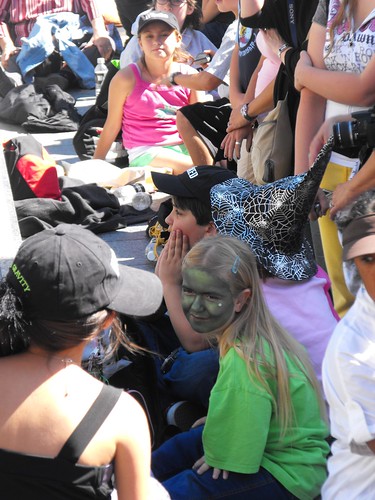
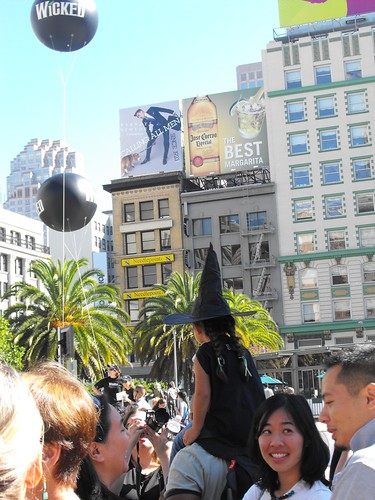 “I remember Marc and (composer) Stephen (Schwartz) having an animated discussion in front of the Geary Theater that ended up in the street,” Stone said. “And one time, Kristin was taking a breather in front of the theater when a homeless man came up to her and said she looked like an alien. She was pretty upset until she realized she was still wearing her head microphone and earpiece.”
“I remember Marc and (composer) Stephen (Schwartz) having an animated discussion in front of the Geary Theater that ended up in the street,” Stone said. “And one time, Kristin was taking a breather in front of the theater when a homeless man came up to her and said she looked like an alien. She was pretty upset until she realized she was still wearing her head microphone and earpiece.”
 But he has managed to produce other shows, some of which we’ve seen in San Francisco such as Fully Committed, The Vagina Monologues and The 25th Annual Putnam County Spelling Bee.
But he has managed to produce other shows, some of which we’ve seen in San Francisco such as Fully Committed, The Vagina Monologues and The 25th Annual Putnam County Spelling Bee.
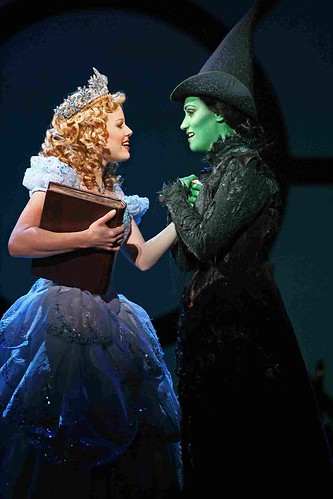 Wicked, the hit musical positively rolling in green, had its world premiere at San Francisco’s Curran Theatre before heading to Broadway ‘s Gershwin Theatre, where it has broken the house record 18 times and regularly grosses more than $1.4 million each week.
Wicked, the hit musical positively rolling in green, had its world premiere at San Francisco’s Curran Theatre before heading to Broadway ‘s Gershwin Theatre, where it has broken the house record 18 times and regularly grosses more than $1.4 million each week.
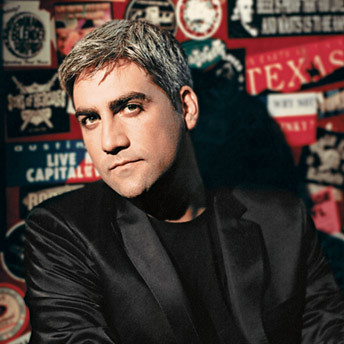 In other SHN/Best of Broadway news, it was announced today that “American Idol” winner Taylor Hicks, now playing the Teen Angel on Broadway in the revival of Grease, will reprise that role when the show goes on the road and heads into the Golden Gate Theatre next March.
In other SHN/Best of Broadway news, it was announced today that “American Idol” winner Taylor Hicks, now playing the Teen Angel on Broadway in the revival of Grease, will reprise that role when the show goes on the road and heads into the Golden Gate Theatre next March.
